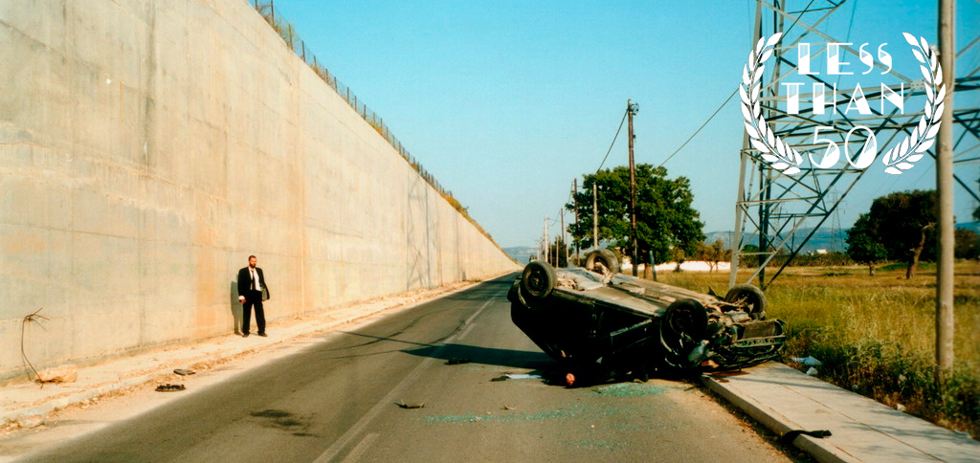In our new column, Less Than (Five) Zero, we take a look at films that have received less than 50 logged watches on Letterboxd, aiming to discover hidden gems in independent and world cinema. This week Conor Bateman looks at Yorgos Lanthimos’ debut feature (as a solo director), the slow moving and strangely compelling Kinetta.
Date Watched: 25th October, 2014
Letterboxd Views (at the time of viewing): 28
Yorgos Lanthimos’ 2009 feature Dogtooth seemed to place the Greek New Weird, a loosely connected movement of darkly comic, oft-absurdist films packed with social commentary, as one of the most exciting developments in world cinema following its Prix Un Certain Regard win at Cannes. That film, which uses the nature/nurture dichotomy to great effect with regards to a family’s self-imposed seclusion from popular culture and normative social development, positioned Lanthimos as a director with a clean yet visceral sense of space and style. Most shots were locked off, many held for an uncomfortably long amount of time. His latest film, 2011’s Alps, seemed to confirm some of his stylistic choices, a sense of visual restraint that heightened the absurdity of the plot. It comes as a surprise then, for his solo directorial debut, Kinetta, to be so relatively experimental, a seemingly placid feature that contains some hyperenegetic camera work and an intentionally vague narrative yet packed with meaning and bold shots.1
The plot centres on a coastal resort town in Greece, the Kinetta of the title, during its off-season, where a local plainclothed policeman, a photographer and a hotel maid clumsily re-enact various murders that have occurred in the town.2 They do so under a general sense of malaise, Lanthimos amusingly contrasts the picturesque setting with the characters’ increasing boredom; we move from a beautiful shot of the sea to find the maid blankly staring out into space, awaiting the arrival of sleep. All three of the characters indulge in fantasy outside of their uniting pastime – the photographer develops a crush on the maid that he actualises by picturing himself as a carer for her, the maid becomes fixated on being another person through entering various hotel rooms and attempting to choke herself and the policeman, obsessed with owning a newer BMW, combats loneliness by hiring prostitutes to follow his detailed commands and then go go-karting with him.
What becomes instantly apparent is that while the plot is vague and the pacing of the film is slow, it has very little dialogue throughout.3 As such, we as an audience become focused on small gestures, facial movements, reading emotional response much like the characters do in the film. We think that, because of this lack of verbal communication, there’s a true intimacy or shorthand at play but the film seems to suggest a distance between all of the characters despite this pattern of behaviour. They are thrown together because they are all isolated yet they maintain a level of isolation with each other.

Like many of the Greek New Weird features, the cast is filled with somewhat familiar faces. Aris Servetalis, who plays the photographer here, is the leader of the troupe in Lanthimos’ Alps, Evangelia Randou of Attenberg is the maid. Costas Xikominos, as the policeman, does not appear to have been in any of the more well-known features within the movement, which is a shame because he delivers quite an interesting performance here.
As per his later films, Lanthimos also comments on gender roles here, with the cast almost entirely male save for Randou’s character, who is almost always the victim in their various re-enactments. By introducing the one-sided romance subplot and placing the photographer as fulfilling a recurring fantasy of caregiver, without overstepping into overtly sexual conduct, an unusual depiction of emotional connection is crafted. The photographer is almost placid by comparison to the authoritarian figure of the policeman, who spends most of his dialogue in the film commanding women to follow his instructions.
The experimental or highly stylised camera work I alluded to earlier is one of the best elements on show, jolting the film into action suddenly after a series of contemplative shots. There is a sequence about halfway through in which we see the policeman in his car as he drives with a serious determination in his eyes. Suddenly we cut to a wall of hedges as the policeman is running past it at around the same speed (in terms of our perception), then he passes us and the camera turns to reveal an abandoned car, a new crime scene. There is another frenetic sequence in which we chase after the maid and she sprints around the hotel floors, trying to reach the lobby. It’s something so simple but so compelling and it runs much longer that you would expect. It manages to turn quick action into a kind of stasis in and of itself.
Whilst Kinetta isn’t as dark as Dogtooth or even Alps (which it resembles a whole lot more), it still makes for intriguing viewing. The humour is less pervasive but it is there, the first re-enactment of a murder is really amusing in its stiltedness. It more clearly resembles an early feature, filled with handheld camera, a clean and washed out colour palette and a reliance on a musical cue to convey change but it is packed with a self-assured sense of tone, or rather a sense that tone doesn’t need to be heavy-handed.
